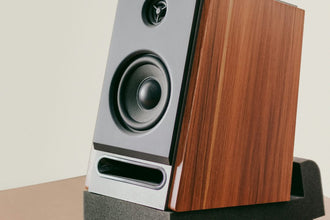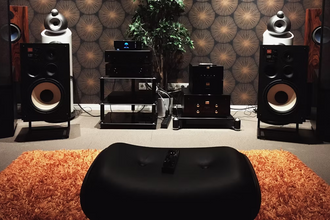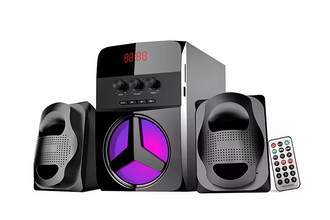Introduction
Hello, everyone, today I will bring you one of the most important parameters of the speaker: sensitivity of the small science, full of knowledge, thank you for your attention and support! If you have any additions or comments, please email us at kevin@coomaer.com(and you may receive a special coupon!). Look forward to interacting with you!
Understanding Speaker Sensitivity
Sensitivity is not our usual sense, Bluetooth connection sensitivity, or the sensitivity of rotating volume knob, etc., when we talk about speaker sensitivity, refers to a basic aspect of the audio system in speaker design, it is important, because it directly affects the power requirements and overall performance, simply put, it is the size of the electroacoustic conversion ability, the higher the sensitivity, It means that we can achieve the desired sound level (can be understood as the sound size) with less power.
Importance in Audio System Design
Efficiency in Power Conversion
-
The efficiency of power conversion is a critical aspect of speaker sensitivity. A high sensitivity speaker can convert electrical power into sound with minimal energy loss, making it an essential consideration in audio system design. When a speaker has high sensitivity, it requires less power to produce the same volume as a less sensitive speaker. This means that for a given input power, a more sensitive speaker will be louder than a less sensitive one. Therefore, understanding the efficiency of power conversion is crucial when selecting speakers for an audio system.
Impact on Overall Performance
-
The impact of speaker sensitivity on overall performance cannot be overstated in audio system design. Speakers with higher sensitivity tend to deliver clearer and more detailed sound, contributing to an enhanced listening experience. On the other hand, speakers with lower sensitivity may require more power to achieve the same volume levels, potentially affecting the quality of the sound produced. Therefore, when aiming for optimal performance in an audio system, considering the sensitivity of speakers is paramount.
Evolution and Technological Impact
Evolution of Sensitivity
Over time, speaker sensitivity has undergone significant evolution alongside technological advancements in speaker design. These advancements have revolutionized the efficiency and responsiveness of speakers, leading to substantial improvements in audio system performance. The evolution of sensitivity has been driven by innovations in materials, transducer technology, and signal processing, resulting in speakers that can convert electrical power into sound with unparalleled precision and clarity.
Impact on Product Selection
The evolution of sensitivity has had a profound influence on the selection of speakers for audio systems. As sensitivity levels have improved, there has been a corresponding need for better integration with amplifier matching. This ensures that the speakers are optimally paired with amplifiers to deliver exceptional performance. Technological advancements have enabled a more refined selection process, allowing audio system designers to choose speakers based on their specific sensitivity requirements, ultimately enhancing the overall efficiency and effectiveness of the system.
Technological Advancements
The technological advancements in speaker design have not only elevated sensitivity but also enhanced the overall efficiency and responsiveness of speakers. These advancements have resulted in more precise sound reproduction and improved power utilization, contributing to a superior listening experience for users.
Future Trends and Innovations
Advancements in Speaker Technology
As technology continues to advance, the future of speaker technology holds promising developments aimed at achieving higher efficiency and performance. Manufacturers are focusing on creating high-efficiency speakers that can deliver exceptional sound quality while utilizing minimal power. This trend is driven by the growing demand for energy-efficient audio systems that do not compromise on performance. Additionally, there is a concerted effort to integrate sensitivity into smart speaker design, leveraging advanced algorithms and signal processing to optimize the overall system performance.
Development of High Sensitivity Speakers
Looking ahead, the development of high sensitivity speakers with adjustable sensitivity settings is anticipated. These responsive speakers will offer unparalleled efficiency, allowing users to customize the sensitivity based on their specific requirements. By providing this flexibility, these speakers will further enhance the overall performance and responsiveness of audio systems, catering to diverse listening preferences and environments.
Achieving Optimal Sound Quality
Critical Role in Acoustic Engineering
When it comes to achieving optimal sound quality, the sensitivity of speakers plays a pivotal role in acoustic engineering and noise control. By understanding the sensitivity of speakers, audio engineers can fine-tune the performance of the speakers to ensure that they respond accurately across different frequency ranges. This precision in speaker responsiveness is crucial for minimizing distortions and ensuring faithful sound reproduction, ultimately contributing to an immersive and high-fidelity listening experience.
Importance of Sensitivity in Performance
The sensitivity of speakers is undeniably vital for achieving optimal sound quality and performance in audio systems. It directly influences the overall listening experience by determining how efficiently electrical power is converted into sound. Speakers with higher efficiency are able to deliver clearer and more detailed sound, enriching the auditory experience for listeners. Additionally, their ability to maintain fidelity at varying volume levels further underscores the significance of speaker responsiveness in shaping the overall performance of audio systems.
Speaker Sensitivity’s Role
The Significance of Speaker Sensitivity in Audio System Design
In the realm of audio system design, speaker sensitivity holds a pivotal role in shaping the overall performance and sound quality. When delving into the intricate process of acoustic system design, understanding the implications of speaker sensitivity becomes paramount. It directly influences how efficiently electrical power is converted into sound, thereby impacting the immersive experience for listeners. By factoring in speaker sensitivity, designers can optimize the performance of audio systems and ensure that they deliver exceptional sound quality without compromising on efficiency.







